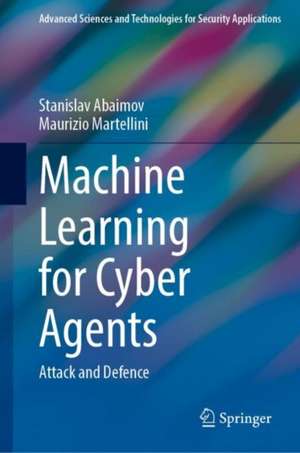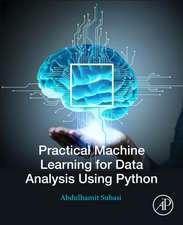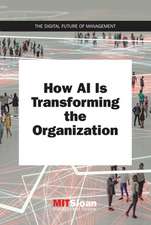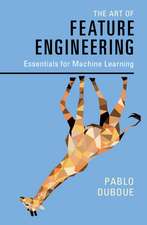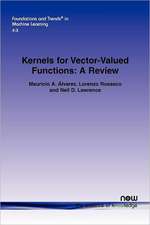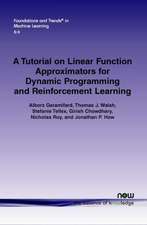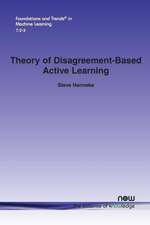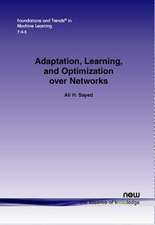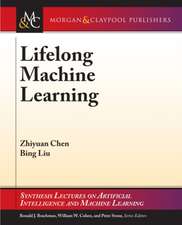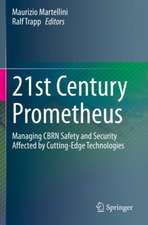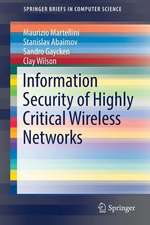Machine Learning for Cyber Agents: Attack and Defence: Advanced Sciences and Technologies for Security Applications
Autor Stanislav Abaimov, Maurizio Martellinien Limba Engleză Hardback – 28 ian 2022
With the abundance of often-confusing information and lack of trust in the diverse applications of AI-based technologies, it is essential to have a book that can explain, from a cyber security standpoint, why and at what stage the emerging, powerful technology of machine learning can and should be mistrusted, and how to benefit from it while avoiding potentially disastrous consequences. In addition, this book sheds light on another highly sensitive area – the application of machine learning for offensive purposes, an aspect that iswidely misunderstood, under-represented in the academic literature and requires immediate expert attention.
| Toate formatele și edițiile | Preț | Express |
|---|---|---|
| Paperback (1) | 585.92 lei 6-8 săpt. | |
| Springer International Publishing – 29 ian 2023 | 585.92 lei 6-8 săpt. | |
| Hardback (1) | 819.85 lei 6-8 săpt. | |
| Springer International Publishing – 28 ian 2022 | 819.85 lei 6-8 săpt. |
Din seria Advanced Sciences and Technologies for Security Applications
- 18%
 Preț: 903.93 lei
Preț: 903.93 lei - 18%
 Preț: 738.20 lei
Preț: 738.20 lei - 18%
 Preț: 969.61 lei
Preț: 969.61 lei - 18%
 Preț: 791.88 lei
Preț: 791.88 lei - 20%
 Preț: 994.92 lei
Preț: 994.92 lei - 15%
 Preț: 643.65 lei
Preț: 643.65 lei - 5%
 Preț: 672.99 lei
Preț: 672.99 lei - 15%
 Preț: 649.22 lei
Preț: 649.22 lei - 20%
 Preț: 1051.84 lei
Preț: 1051.84 lei - 15%
 Preț: 704.36 lei
Preț: 704.36 lei - 17%
 Preț: 491.11 lei
Preț: 491.11 lei - 20%
 Preț: 1162.37 lei
Preț: 1162.37 lei - 15%
 Preț: 644.95 lei
Preț: 644.95 lei - 20%
 Preț: 934.69 lei
Preț: 934.69 lei - 20%
 Preț: 1273.74 lei
Preț: 1273.74 lei - 20%
 Preț: 991.60 lei
Preț: 991.60 lei - 20%
 Preț: 936.37 lei
Preț: 936.37 lei - 20%
 Preț: 889.12 lei
Preț: 889.12 lei - 15%
 Preț: 704.36 lei
Preț: 704.36 lei - 9%
 Preț: 732.28 lei
Preț: 732.28 lei - 18%
 Preț: 783.98 lei
Preț: 783.98 lei - 18%
 Preț: 1223.88 lei
Preț: 1223.88 lei - 20%
 Preț: 480.05 lei
Preț: 480.05 lei - 15%
 Preț: 648.42 lei
Preț: 648.42 lei - 18%
 Preț: 1224.36 lei
Preț: 1224.36 lei -
 Preț: 381.43 lei
Preț: 381.43 lei - 20%
 Preț: 1068.44 lei
Preț: 1068.44 lei - 18%
 Preț: 734.59 lei
Preț: 734.59 lei - 15%
 Preț: 586.38 lei
Preț: 586.38 lei - 20%
 Preț: 937.81 lei
Preț: 937.81 lei - 18%
 Preț: 1120.18 lei
Preț: 1120.18 lei - 24%
 Preț: 590.42 lei
Preț: 590.42 lei - 18%
 Preț: 1007.17 lei
Preț: 1007.17 lei - 24%
 Preț: 815.83 lei
Preț: 815.83 lei - 24%
 Preț: 747.51 lei
Preț: 747.51 lei - 20%
 Preț: 937.81 lei
Preț: 937.81 lei - 18%
 Preț: 721.30 lei
Preț: 721.30 lei - 15%
 Preț: 646.75 lei
Preț: 646.75 lei - 15%
 Preț: 698.62 lei
Preț: 698.62 lei - 18%
 Preț: 794.07 lei
Preț: 794.07 lei - 18%
 Preț: 738.06 lei
Preț: 738.06 lei -
 Preț: 388.13 lei
Preț: 388.13 lei
Preț: 819.85 lei
Preț vechi: 1024.81 lei
-20% Nou
Puncte Express: 1230
Preț estimativ în valută:
156.90€ • 163.20$ • 129.53£
156.90€ • 163.20$ • 129.53£
Carte tipărită la comandă
Livrare economică 14-28 aprilie
Preluare comenzi: 021 569.72.76
Specificații
ISBN-13: 9783030915841
ISBN-10: 3030915840
Pagini: 227
Ilustrații: XV, 227 p. 27 illus., 23 illus. in color.
Dimensiuni: 155 x 235 mm
Greutate: 0.52 kg
Ediția:1st ed. 2022
Editura: Springer International Publishing
Colecția Springer
Seria Advanced Sciences and Technologies for Security Applications
Locul publicării:Cham, Switzerland
ISBN-10: 3030915840
Pagini: 227
Ilustrații: XV, 227 p. 27 illus., 23 illus. in color.
Dimensiuni: 155 x 235 mm
Greutate: 0.52 kg
Ediția:1st ed. 2022
Editura: Springer International Publishing
Colecția Springer
Seria Advanced Sciences and Technologies for Security Applications
Locul publicării:Cham, Switzerland
Cuprins
1. Introduction.- 2. Understanding Machine Learning.- 3. Defence.- 4. Attack.- 5. Feasibility and Misconceptions.- 6. International resonance.- 7. Prospects.- 8. Conclusion.
Notă biografică
Dr. Stanislav Abaimov is a research associate at the Department of Computer Science, University of Bristol. He received a PhD in Cyber Security and Electronic Engineering from the University of Rome, Tor Vergata; and earned a degree of MSc in Information Security at the Royal Holloway, University of London.
Stanislav’s research area is related to the security of industrial control systems and machine learning application for cyber defence, including in autonomous systems. He is a contributing member of the Pugwash Conferences on Science and World Affairs.
Prof. Maurizio Martellini is Director of the Insubria Center on International Security (ICIS), Secretary General of the Landau Network-Fondazione Alessandro Volta (LN-FAV), Professor of Physics at the University of Insubria (Como, Italy), Member of the Pugwash General Conferences, advisor of the Italian Ministryof Foreign Affairs and was Executive Secretary of the former InternationalWorking Group (IWG).
As expert in non-proliferation and disarmament issues, ICIS Director and LNFV Secretary General,
Prof. Martellini organizes International Conferences, Schools and Workshops and edit publications as well as specific Case Studies. His fields of Research and Analysis are: theoretical and nuclear physics, cyber security of nuclear infrastructures, global scientists engagement, management anddisposal of hazmats; scientific and technological aspects concerning international security; CBRN risks mitigation issues; science and engineering diplomacy; and CBRN education and awareness. He is also Team Leader and Expert of several EU CBRN CoE projects.
Since 2016 he is the Scientific Director and Co-founder of TheranostiCentre Srl, an innovative startup who studied a new intraoperative radiotherapy system that uses neutron beams to irradiate a wider and deeper range of tumors. The new technology invented by Prof. Martellini, has recently obtained threepatents, one Italian and two European. Author of more than 200 publications in the fields of fundamental physics on national and international specialized journals and articles in national and international geopolitical and international affairs journals like Limes and Heartland, he is also co-editor of several books and reports. His publications, cited over 2000 times, include:
• M. Martellini, R. Trapp, 21st Century Prometheus. Managing CBRN Safety and Security Affectedby Cutting-Edge Technologies, Springer (2019)
• M. Martellini, A. Malizia, Cyber and Chemical, Biological, Radiological, Nuclear, Explosives
Challenges. Threats and Counter Efforts, Springer (2017)
• M. Martellini, S. Abaimov, S. Gaycken, C. Wilson, Information Security of Highly Critical
Wireless Networks, Springer (2017)
• M. Martellini, Cyber Security Deterrence and IT Protection for Critical Infrastructures, Springer
(2013)
• L. Bonora, G.Mussardo, A. Schwimmer, L. Girardello, M. Martellini,Integrable Quantum Field Theories, Springer (1993)
• Science For Peace series, UNESCO
• Maurizio Martellini, Jason Rao. The Risk of Skilled Scientist Radicalization and Emerging Biological Warfare Agents. NATO Science for Peace and Security series, (2017)
Stanislav’s research area is related to the security of industrial control systems and machine learning application for cyber defence, including in autonomous systems. He is a contributing member of the Pugwash Conferences on Science and World Affairs.
Prof. Maurizio Martellini is Director of the Insubria Center on International Security (ICIS), Secretary General of the Landau Network-Fondazione Alessandro Volta (LN-FAV), Professor of Physics at the University of Insubria (Como, Italy), Member of the Pugwash General Conferences, advisor of the Italian Ministryof Foreign Affairs and was Executive Secretary of the former InternationalWorking Group (IWG).
As expert in non-proliferation and disarmament issues, ICIS Director and LNFV Secretary General,
Prof. Martellini organizes International Conferences, Schools and Workshops and edit publications as well as specific Case Studies. His fields of Research and Analysis are: theoretical and nuclear physics, cyber security of nuclear infrastructures, global scientists engagement, management anddisposal of hazmats; scientific and technological aspects concerning international security; CBRN risks mitigation issues; science and engineering diplomacy; and CBRN education and awareness. He is also Team Leader and Expert of several EU CBRN CoE projects.
Since 2016 he is the Scientific Director and Co-founder of TheranostiCentre Srl, an innovative startup who studied a new intraoperative radiotherapy system that uses neutron beams to irradiate a wider and deeper range of tumors. The new technology invented by Prof. Martellini, has recently obtained threepatents, one Italian and two European. Author of more than 200 publications in the fields of fundamental physics on national and international specialized journals and articles in national and international geopolitical and international affairs journals like Limes and Heartland, he is also co-editor of several books and reports. His publications, cited over 2000 times, include:
• M. Martellini, R. Trapp, 21st Century Prometheus. Managing CBRN Safety and Security Affectedby Cutting-Edge Technologies, Springer (2019)
• M. Martellini, A. Malizia, Cyber and Chemical, Biological, Radiological, Nuclear, Explosives
Challenges. Threats and Counter Efforts, Springer (2017)
• M. Martellini, S. Abaimov, S. Gaycken, C. Wilson, Information Security of Highly Critical
Wireless Networks, Springer (2017)
• M. Martellini, Cyber Security Deterrence and IT Protection for Critical Infrastructures, Springer
(2013)
• L. Bonora, G.Mussardo, A. Schwimmer, L. Girardello, M. Martellini,Integrable Quantum Field Theories, Springer (1993)
• Science For Peace series, UNESCO
• Maurizio Martellini, Jason Rao. The Risk of Skilled Scientist Radicalization and Emerging Biological Warfare Agents. NATO Science for Peace and Security series, (2017)
Textul de pe ultima copertă
The cyber world has been both enhanced and endangered by AI. On the one hand, the performance of many existing security services has been improved, and new tools created. On the other, it entails new cyber threats both through evolved attacking capacities and through its own imperfections and vulnerabilities. Moreover, quantum computers are further pushing the boundaries of what is possible, by making machine learning cyber agents faster and smarter.
With the abundance of often-confusing information and lack of trust in the diverse applications of AI-based technologies, it is essential to have a book that can explain, from a cyber security standpoint, why and at what stage the emerging, powerful technology of machine learning can and should be mistrusted, and how to benefit from it while avoiding potentially disastrous consequences. In addition, this book sheds light on another highly sensitive area – the application of machine learning for offensive purposes, an aspect that iswidely misunderstood, under-represented in the academic literature and requires immediate expert attention.
With the abundance of often-confusing information and lack of trust in the diverse applications of AI-based technologies, it is essential to have a book that can explain, from a cyber security standpoint, why and at what stage the emerging, powerful technology of machine learning can and should be mistrusted, and how to benefit from it while avoiding potentially disastrous consequences. In addition, this book sheds light on another highly sensitive area – the application of machine learning for offensive purposes, an aspect that iswidely misunderstood, under-represented in the academic literature and requires immediate expert attention.
Caracteristici
Classifies Attack and Defence applications of Machine Learning in cyber security Explores impact on international discussions Addresses future challenges of machine learning and cyber security
